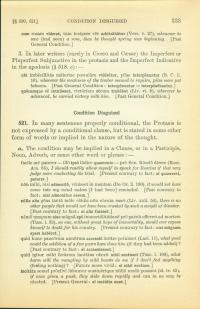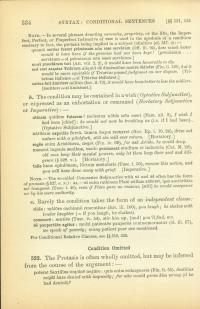521. In many sentences properly conditional, the protasis is not expressed by a conditional clause, but is stated in some other form of words or implied in the nature of the thought.
a. The condition may be implied in a clause, or in a participle, noun, adverb, or some other word or phrase.
Facile mē paterer—illō ipsō iūdice quaerente—prō Sex. Rōsciō dīcere. (Rosc. Am. 85)
I should readily allow myself to speak for Roscius if that very judge were conducting the trial.
[Present contrary to fact: sī quaereret, paterer]
Nōn mihi, nisi admonitō, vēnisset in mentem. (De Or. 2.180)
It would not have come into my mind unless [I had been] reminded.
[Past contrary to fact: nisi admonitus essem]
Nūlla aliagēns tantā mōle clādis nōn obruta esset. (Liv. 22.54)
There is no other people that would not have been crushed by such a weight of disaster.
[Past contrary to fact: sī alia fuisset]
Nēmō umqua sine māgnā spēimmortālitātis sē prō patriā offerret ad mortem. (Tusc. 1.32)
No one, without great hope of immortality, would ever expose himself to death for his country.
[Present contrary to fact: nisi māgnam spem habēret]
Quid hunc paucōrum annōrum accessiōiuvāre potuisset? (Lael. 11)
What good could the addition of a few years have done him (if they had been added)?
[Past contrary to fact: sī accessissent]
Quid igitur mihi ferārum laniātus oberit nihil sentientī. (Tusc. 1.104)
What harm will the mangling by wild beasts do me if I don't feel anything?
(me . . . feeling nothing)
[Future more vivid: sī nihil sentiam]
Incitāta semel prōclīvī lābuntur sustinērīque nūllō modō possunt. (id. 4.42)
If once given a push, they slide down rapidly and can in no way be checked.
[Present General: sī incitāta sunt]
Note— In several phrases denoting necessity, propriety, or the like, the imperfect, perfect, or pluperfect Indicative of esse is used in the apodosis of a condition contrary to fact, the protasis being implied in a subject infinitive (cf. § 517.c).
Quantō melius fuerat prōmissum nōn esse servātum! (Off. 3.94)
How much better would it have been if the promise had not been kept!
[prōmissum . . . servātum = sī prōmissum nōn esset servātum.]
Morī praeclārum fuit. (Att. 8.2.2)
It would have been honorable to die.
Sed erat aequius Triārium aliquid dē dissēnsiōne nostrā iūdicāre. (Fin. 2.119)
But it would be more equitable if Triarius passed judgment on our dispute.
[Triārium iūdicāre = sī Triārius iūdicāret]
Satius fuit āmitteremīlitēs. (Inv. 2.73)
It would have been better to lose the soldiers.
[āmittere = sī āmīsisset]
b. The condition may be contained in a wish (Optative Subjunctive), or expressed as an exhortation or command (Hortatory Subjunctive or Imperative).
Utinam quidem fuissem! Molestus nōbīs nōn esset. (Fam. 12.3)
I wish I had been [chief]: he would not now be troubling us.
[i.e. if I had been; Optative Subjunctive]
Nātūram expellās furcā, tamen ūsque recurret. (Hor. Ep. 1.10.24)
Drive out nature with a pitchfork, still she will ever return.
[Hortatory]
Rogēs enim Aristōnem, neget. (Fin. 4.69) For ask Aristo, he would deny.
Manent ingenia senibus, modo permaneat studium et industria. (Cat. M. 22)
Old men keep their mental powers, only let them keep their zeal and diligence. (§ 528, Note)
[Hortatory]
Tolle hanc opīniōnem, lūctum sustuleris. (Tusc. 1.30)
Remove this notion, and you will have done away with grief. [Imperative]
Note— The so-called Concessive Subjunctive with ut and nē often has the force of protasis (§ 527.a, Note).
Ut enim ratiōnem Platō nūllam adferret, ipsā auctōritāte mē frangeret. (Tusc. 1.49)
Even if Plato gave no reasons, [still] he would overpower me by his mere authority.
c. Rarely the condition takes the form of an independent clause:
Rīdēs: mâiōre cachinnō concutitur. (Iuv. 3.100)
You laugh; he shakes with louder laughter.
(= if you laugh, he shakes)
commovē : sentiēs, etc. (Tusc. 4.54)
Stir him up, [and] you'll find, etc.
Dē paupertāte agitur: multī patientēs pauperēs commemorantur. (id. 3.57)
We speak of poverty; many patient poor are mentioned.
For Conditional Relative Clauses, see §§ 519 - 520.


